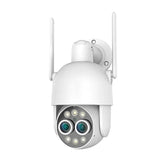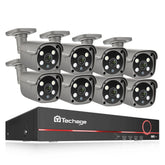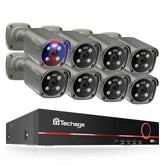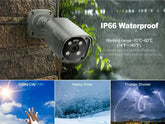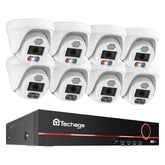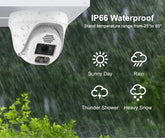What's a Solar Cellular Security Camera and How Does It Work?
In the ever-evolving world of home security, the solar cellular security camera has emerged as a revolutionary device that combines advanced technology with eco-friendly energy solutions. But what exactly is a solar cellular security camera, and how does it work? Let's delve into the details.
A solar cellular security camera is a surveillance device powered by solar energy and equipped with cellular connectivity. Unlike traditional security cameras that rely on wired electricity or Wi-Fi for power and communication, a solar cellular camera harnesses the power of the sun through solar panels and uses cellular networks (such as 4G LTE) to transmit video footage and data. For example, Techage 4G camera

How does a 4G solar camera work?
- Solar Power Generation: The solar panels mounted on or near the camera capture sunlight and convert it into electrical energy. This energy is stored in rechargeable batteries, which power the camera even during nighttime or cloudy days.
- Cellular Communication: Instead of relying on Wi-Fi, the camera uses cellular networks to send and receive data. This means it can operate independently of a home or business Wi-Fi network, making it ideal for remote or hard-to-reach locations.
- Video Recording and Transmission: The camera captures video footage and, when triggered by motion or other events, sends alerts and video clips to a mobile app or cloud storage service. Users can then access and review these recordings from anywhere with an internet connection.
Advantages of Cellular 4G Solar Security Cameras
The integration of solar power and cellular connectivity brings a multitude of benefits to security cameras, making them an attractive option for many home and business owners.
- Off-Grid Capability: Solar cellular cameras do not require a wired power connection or Wi-Fi router, allowing them to be placed in locations where electricity and internet access are unavailable or impractical.
- Enhanced Reliability: Cellular networks are generally more reliable than Wi-Fi, especially in rural or remote areas. This ensures that the camera can consistently transmit video footage and alerts, even when Wi-Fi signals are weak or unstable.
- Cost Savings: Over time, solar-powered cameras can reduce electricity costs, as they rely on free solar energy rather than grid power. Additionally, cellular plans for security cameras are often more affordable than high-speed internet services, especially when considering the convenience and reliability they provide.
- Easy Installation and Mobility: The lack of wiring and dependency on Wi-Fi simplifies installation and allows for greater flexibility in camera placement. Solar cellular cameras can be easily moved to different locations as needed, making them a versatile security solution.
- Environmental Benefits: By using renewable solar energy, these cameras contribute to reducing carbon emissions and promoting sustainable living.
Who Is the 4G Solar Security Camera For?
The versatility of 4G solar security cameras makes them suitable for a wide range of users and applications. Here are some key groups who can benefit from these devices:
- Homeowners in Remote Locations: For those living in rural or isolated areas, solar cellular cameras provide a reliable and cost-effective way to monitor their property, even without access to traditional power and internet services.
- Business Owners: Small businesses, farms, and construction sites can use these cameras to enhance security and monitor operations in real-time, regardless of location or power infrastructure.
- RV and Boat Owners: For those who love the outdoors and travel frequently, solar cellular cameras offer a portable and reliable security solution that can be easily mounted on recreational vehicles or boats.
- Property Managers: Real estate agents, landlords, and property managers can use these cameras to keep an eye on multiple properties, ensuring the safety and security of tenants and assets.
Key Considerations for Choosing a Solar Powered 4G Cellular Camera
When shopping for a solar-powered 4G cellular camera, there are several factors to consider to ensure you select the best device for your needs.
- Battery Life and Storage Capacity: Look for cameras with large-capacity batteries that can store enough energy to power the camera through multiple nights or cloudy days. Additionally, consider the storage options for video footage, whether it's local storage on an SD card or cloud-based storage.
- Video Quality: High-resolution cameras with wide-angle lenses and night vision capabilities will provide clearer and more detailed footage, making it easier to identify individuals and objects.
- Cellular Connectivity: Ensure the camera is compatible with your local cellular networks and check the data plans offered by the provider. Consider the cost, data limits, and coverage area to find the best fit for your needs.
- Weather Resistance: Since solar panels and cameras are often exposed to the elements, look for devices with high weather resistance ratings to ensure they can withstand extreme temperatures, rain, snow, and other environmental conditions.
- App and Cloud Services: Evaluate the mobile app's usability, features, and compatibility with your smartphone or tablet. Cloud services should offer secure storage, easy access to recordings, and options for real-time alerts and notifications.
Popular 4G Solar Camera Compare
To help you make an informed decision, here's a comparison of some popular 4G solar security cameras on the market:
- Reolink Go PT: This camera offers 1080p video resolution, a 140° wide-angle lens, and advanced motion detection. It features a built-in battery that can last up to 6 months on a single charge and supports both local and cloud storage. The Reolink app provides real-time monitoring and alerts.
- Arlo Solar-Powered 4G LTE Camera: With a sleek design and 2K video resolution, this camera offers excellent image quality and clarity. It features a rechargeable battery, color night vision, and smart alerts. The Arlo app allows for easy setup, monitoring, and control.
- Blink Outdoor Solar-Powered Camera with 4G LTE: This camera provides 1080p HD video, two-way audio, and motion detection. It includes a solar panel and rechargeable battery for continuous power. The Blink app offers live view, cloud storage, and customizable alerts.
Conclusion
Solar cellular security cameras represent a significant leap forward in home and business security. By combining the power of solar energy with cellular connectivity, these devices offer unparalleled reliability, convenience, and cost savings. Whether you're a homeowner in a remote location, a business owner seeking to enhance security, or an outdoor enthusiast looking for a portable solution, a solar cellular camera can provide the peace of mind you deserve.
When choosing a camera, consider factors such as battery life, video quality, cellular connectivity, weather resistance, and app features to ensure you select the best device for your needs. With so many options available, there's a solar cellular security camera that's perfect for every situation.
FAQ
Q: How long does the battery last on a solar-powered 4G camera?
A: Battery life depends on several factors, including the camera's specifications, the amount of sunlight received, and the frequency of use. High-capacity batteries can last several months on a single charge, even with regular use.
Q: Do I need a Wi-Fi connection for a solar cellular camera?
A: No, solar cellular cameras use cellular networks to transmit data, so they do not require a Wi-Fi connection. This makes them ideal for locations without internet access.
Q: Can I view the camera footage remotely?
A: Yes, most solar cellular cameras come with mobile apps that allow you to view live footage, receive alerts, and access recorded videos from anywhere with an internet connection.
Q: Are solar cellular cameras weatherproof?
A: Yes, solar cellular cameras are designed to withstand various weather conditions, including rain, snow, and extreme temperatures. Look for cameras with high weather resistance ratings to ensure they can handle your local climate.
Q: How do I choose the right cellular plan for my solar camera?
A: Consider the data limits, cost, and coverage area of different cellular plans. Choose a plan that offers enough data for your needs and ensures reliable coverage in your area. You may also want to consider any additional features or benefits offered by the plan, such as included cloud storage or priority customer support.




